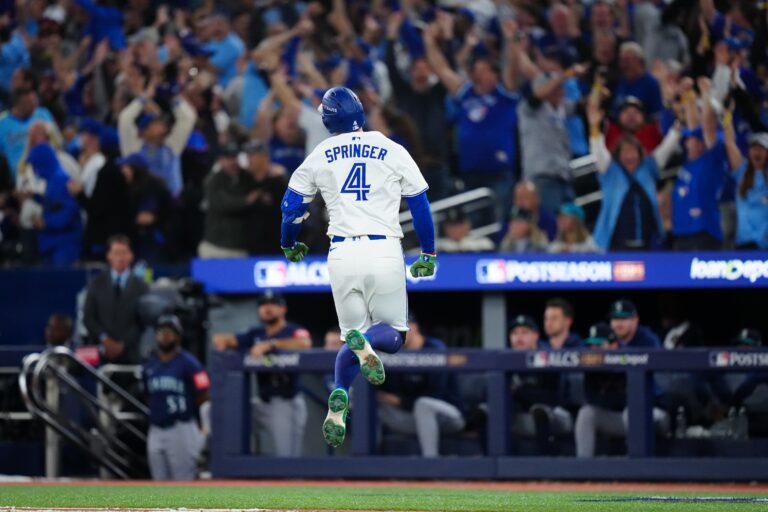The Toronto Blue Jays are worthy champions by any measure, whether that be Vladimir Guerrero Jr.’s outsized gifts, George Springer’s uncanny sense of the moment, or Alejandro Kirk’s combination of improbable results and very civilian silhouette. They earned their way to this World Series by reducing the Seattle Mariners to Julio Rodriguez, Cal Raleigh, and a bunch of other employees, and more power to them for that.
They’re going to need all that power and more given what awaits them, and what we all would like to see—a fully scheduled, extended drama playing out across a World Series that lasts until November. The alternative is the Los Angeles Dodgers administering one final beatdown to an overmatched challenger, and a winter of people wallowing in the time-suck that is the salary cap debate.
We’ll look ahead to that nightmare momentarily, but for the moment it’s worth celebrating the Blue Jays as the Maple Leafs, But Successful. In a town built on international business and angst over its hockey team, the Jays have made themselves a worthy challenger for all that civic energy and anxiety: a formidable lineup that pounds the unworthy into submission not only with volume but timing, as when Springer golfed a 96-mph sinker from Eduard Bazardo into the left-center field seats at Rogers Centre in the home half of the seventh to eradicate the slim advantage the Mariners had built on solo homers from Rodriguez and Raleigh. Springer’s shot was majestic, to be sure, but unlike either of those two Seattle homers, it brought home a pair of baserunners. That and two spotless innings from the bullpen put the Jays in their first World Series since 1993. It was a fine game with a perfectly just outcome by any standard, save that of Mariners fans who wanted to imagine J-Rod and the Dumper defending their honor in what would have been the first all-West Coast Series since 2002.
Instead the Mariners got a gut punch, and the rest of us have this, with all the expected blather about the Dodgers having an unfair advantage on the Jays and everyone else because of how effectively they spend money on baseball players, which kind of undercuts the unfairness argument right at the start. The Dodgers are quite possibly the most overwhelming team the sport has seen since, well, pick a Yankees era, and they got there because they do what you wish your favorite team would do—spend on the product. They have Shohei Ohtani and the most dominant starting rotation in decades—again, your own mileage may vary, there—and a lineup built for maximum opponent exhaustion. They have bought and retained a number of great players, and shown an organizational knack for making freely available good players much better than they had previously been elsewhere. If their bullpen were better, there’d be no point in the exercise at all; the brusque manner in which the Dodgers dispelled the Brewers’ magic in the NLCS suggests that the Mariners might end up grateful that they avoided the Series entirely. In short, you want your team to be the Dodgers, so we’ll have none of your they’re-the-enemies-of-fun whingeing. They’re good for the most provably valid reason, and therefore you’re wrong.
Still, even if you are a Dodger fan and want all the Ohtani in your face that your eyes can handle, you should want seven more cracks at this, and the only issue there is whether the Blue Jays can offer a sufficient retort. A sweep, which is what many people fear given how the Dodgers made such short work of the Reds, Phillies, and Brewers, would not do at all; you should also want all the Guerrero you can get just on principle.
In other words, there are things here for everyone. The question is whether there is a sufficient supply of them to make what seems in advance like the ingredients for a boilerplate rout into an actual series to remember. And here, the enemy is actually quite clear, and it is not Ohtani. It is the Dodgers’ starting rotation, which of course inescapably leads back to Ohtani.
That rotation is Blake Snell, and Yoshinobu Yamamoto and Tyler Glasnow, and then it is Ohtani. In allowing an average of one run, three hits, and two walks over six-and-a-half innings per start this postseason, the Dodgers have overwhelmed teams even in games in which Ohtani didn’t hit multiple home runs. His was not even the most stunning pitching performance in the NLCS, despite those six innings of two-hit, 10-strikeout ball in the clincher over Milwaukee—that one came from Snell three games earlier, an eight-inning one-hitter in Game 1 that told the Brewers all they needed to know about the path the series would take. The three teams who took the knee in the Dodgers’ court over the playoffs hit a combined .132 with two homers against a rotation that is so unseasonably solid-state that Dave Roberts never had to employ an opener. They are playing 1980s baseball with 2025 tools, and the preeminence of the bullpen in the modern game has not touched these Dodgers mostly because it hasn’t had to. Roberts has looked like a brilliant manager this postseason because he has been forced to make fewer pitching changes than anyone else, which is always the preferred metric when looking for managerial idiocy, and also because his most challenging lineup decision has been where to bat Teoscar Hernandez.
That pitching is what the Blue Jays will have to overcome, much more than any awe they hold for Ohtani, who was having a frankly meh October until last Friday, when he reminded everyone that among his fellow superstar outliers he resides somewhere in the Oort Cloud. The Jays hit the ball well enough, but so did the Phillies, and they only won one of four. Another way to say this is that while we know what we want, we also know that it’s probably not the way to bet.
But it is right to want it anyway, because in the matter of games, more is always better. “Game 7” may not be the sweetest phrase in sports, as the Fox yammerers kept saying last night—right now, the answer there is, “hey, we’re playing the Jets this week”—but it is the freshest alternative to “The Dodgers are too good, someone must punish them.” The Dodgers are baseball’s tush push, a play that can’t be stopped until it is, and as long as they are dragged to seven games, they can do what they want once they get there, even if the series ends with a 28-0 game in which Andy Pages hits all the homers and Ohtani takes a perfect game into the ninth inning, only to be pulled for Alex Vesia for the final out because he struck out Andres Gimenez three years ago. Hate them individually and collectively all you want, if that’s how you prefer to kill an evening—let’s just hope the maximum number of games in which to enjoy that hatred.


